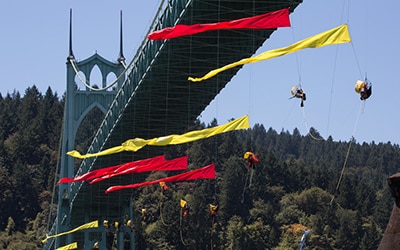Last week, in Shell Offshore v. Greenpeace, the federal Ninth Circuit Court of Appeals issued an order vacating a civil contempt order that was issued against Greenpeace last summer during the Shell No! banner hang off the St. John’s Bridge. In July, a number of activists had suspended themselves from the bridge over the Willamette River in Portland, Oregon to temporarily block Shell’s contracted vessel, the Fennica, from leaving the Portland harbor. The Fennica carried a crucial piece of oil drilling equipment and Shell planned to send the Fennica north to Alaska’s Chukchi Sea to conduct oil drilling in the Arctic.
Prior to the bridge protest, in May 2015, Shell had received a district court order granting a preliminary injunction against Greenpeace that established “safety zones” around each of its contracted vessels to prevent protestors from interfering with oil drilling operations. Greenpeace appealed the preliminary injunction. While the appeal was pending, the St. John’s Bridge protest occurred. The local district court issued a “preliminary order” that the Greenpeace activists were in civil contempt of the preliminary injunction order. The contempt order stated that the court would impose fines of $2,500/hour the first day, $5,000/hour the second day, $7,500/hour the third day, and $10,000/hour thereafter “so long as the activists continue to hang from the St. John’s Bridge in Portland.”
The court’s civil contempt order against Greenpeace was expressly denominated as “preliminary” because it was “entered without a full evidentiary hearing in light of the emergency, expedited nature of the situation in Portland.” The district court contemplated holding an evidentiary hearing at a later date. However, no further district court proceedings occurred because there was an appeal pending.
Approximately two months after the protest, while the appeal was still pending, Shell announced that it no longer planned to conduct exploratory oil drilling in Alaska’s Chukchi Sea. In November 2015, the preliminary injunction against Greenpeace expired by its own terms, and Shell did not seek to renew it.
Last week the federal appeals court held that because there is no longer a plan for oil drilling or a preliminary injunction in effect, the appeal of the preliminary injunction against Greenpeace is now moot. Furthermore, because the preliminary injunction is no longer in effect, there can be no civil contempt regarding that preliminary injunction. Therefore, the appeals court vacated the preliminary civil contempt order against Greenpeace.
The court essentially distinguished between two kinds of civil contempt — compensatory and coercive. The court found that the contempt order in this case was coercive because it was intended to force Greenpeace to comply with a court order. The court held: “A court cannot impose a coercive civil contempt sanction if the underlying injunction is no longer in effect.” Thus, in this case, “[e]nforcing the fee-schedule monetary sanction would only serve to punish Greenpeace for its past contumacious actions.” However, punitive sanctions would constitute criminal contempt, not civil contempt, and such “criminal penalties may not be imposed on someone who has not been afforded the protections that the Constitution requires of such criminal proceedings.” Thus, the court held that “in cases where the underlying proceeding has been rendered moot, the coercive contempt proceeding must be vacated in order to avoid a due-process violation. . . Accordingly, [in this case] the pending contempt proceedings must be vacated.”

